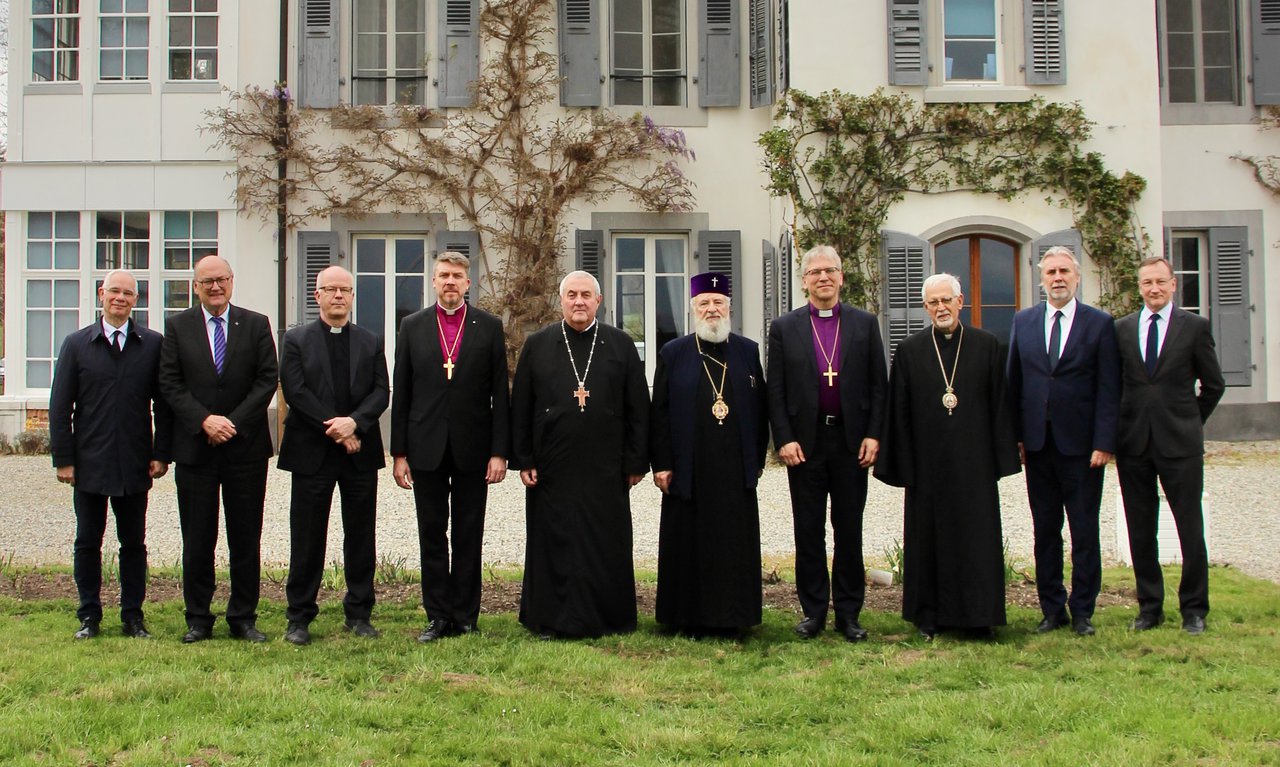The World Council of Churches (WCC) convened an ecumenical roundtable consultation on the situation in Ukraine, which took place 30 March at the Bossey Ecumenical Institute. Bishop Zoltán Balog, Ministerial President of the Synod of RCH attended the meeting representing Hungarian member churches. Read the message from the participants.

Senior representatives of WCC member churches from several European countries neighbouring and directly affected by the current conflict joined the WCC ecumenical round table consultation on the situation in Ukraine, on 30 March at the Bossey Ecumenical Institute, Switzerland.
“Steadfast love and faithfulness will meet; righteousness and peace will kiss each other.” Psalm 85:10
At this time of war in Ukraine and widening divisions in the world, senior representatives of WCC member churches from several European countries neighbouring and directly affected by the current conflict[i] gathered in Bossey, Switzerland, on 30 March 2022 upon the invitation of the Acting General Secretary of the World Council of Churches (WCC). The purpose of this meeting was to consult among us, to share perspectives on the conflict and its causes, and to discern possible paths forward for the churches together in working for peace in the midst of war. We regret that it was not possible for the representatives from Russia and Ukraine to travel to join us for this consultation, though they had accepted the invitation to do so.
We participants in this meeting collectively affirm – in line with the mandate and policy of the WCC – our rejection of war as against the will of God, and of the use of deadly military force as a means of resolving disputes – in Ukraine or anywhere else. Such disputes could and should be resolved peacefully, by sincere and meaningful dialogue and negotiations. We denounce the military aggression launched by the leadership of the Russian Federation against the people of the sovereign nation of Ukraine. We affirm the right of the people of Ukraine to defend themselves against this aggression. We grieve for all the precious lives already lost on both sides – each one of them so dear to God and to their loved ones – and for the terrible destruction and displacement of people and communities already caused.
We lift up the compassionate care and support offered to the Ukrainian refugees by the authorities, local communities, churches and church-related organizations in neighbouring and other countries, as a good example of the care and support all refugees fleeing from every such threat to life and dignity should receive.
We join in calling for a cease-fire in Ukraine, for humanitarian corridors to be opened and respected, and for sustained negotiations for a secure and just peace, to bring an end to this suffering.
We call urgently for recognition, respect and protection of the God-given human dignity of every human being in harm’s way due to this or any other armed conflict, and appeal especially for the protection of all civilians and civilian infrastructure as a matter of fundamental moral duty, as well as a responsibility under international humanitarian law. All those responsible for violations of applicable laws and crimes against humanity must be held fully accountable for their actions.
Beyond the borders of Ukraine, and beyond the new diaspora of its displaced and suffering people, we are also gravely concerned about the even wider, longer-term consequences of this unjustifiable aggression. The global food security crisis, already acute as a result of the consequences of the COVID-19 pandemic, will now be vastly more severe, affecting especially the poorest and most vulnerable countries and communities of the world. Moreover, at this time when the whole world should be uniting in response to the common existential challenge of the looming climate catastrophe, the outrageous immorality of Russia’s attack on its neighbour is greatly amplified.
We share the strong conviction that there is no legitimate way in which this armed aggression and its terrible consequences can be justified or tolerated from the perspective of our most fundamental Christian faith principles.
Acutely conscious of the grave risks of further escalation of the violence in Ukraine, of wider and even more destructive conflict, and of the abhorrent threat of weapons of mass destruction, we appeal for diplomacy instead of threats, dialogue instead of confrontation and exclusion, truth instead of disinformation, and for the voice of conscience - inspired by God’s will for all the people of God and God’s unique creation - to be heard.
As leaders of Christian communities facing this conflict and its consequences, and aware that sister churches hold different perspectives on the conflict’s root causes, we stress the importance of the WCC as the ecumenical movement’s leading instrument for sharing divergent perspectives, struggling with our differences, and seeking reconciliation and unity in word and deed to which our faith calls us. We join in fervent prayer for peace in Ukraine, in Europe and in the whole world, for the transformation of hearts and minds presently fixated on confrontation and violence, and for a turning to the path of peace where our Lord and Saviour Jesus Christ leads us.
We affirm the role of the WCC as a platform for ecumenical dialogue in the midst of such tragic conflict and political divisions, and the critical need for such dialogue - including with our counterparts from Russia and Ukraine - in this difficult context. We acknowledge the calling of churches and of the ecumenical movement to be peace-makers, and mutually commit to continuing to meet and to work together for justice and peace, counting on the good offices of the WCC to continue to convene us and enable our intent. We ask the WCC Acting General Secretary to renew his invitation to the WCC member churches in Russia and Ukraine to join us in another roundtable discussion as soon as possible.
“Blessed are the peacemakers, for they will be called children of God.” Matthew 5:9